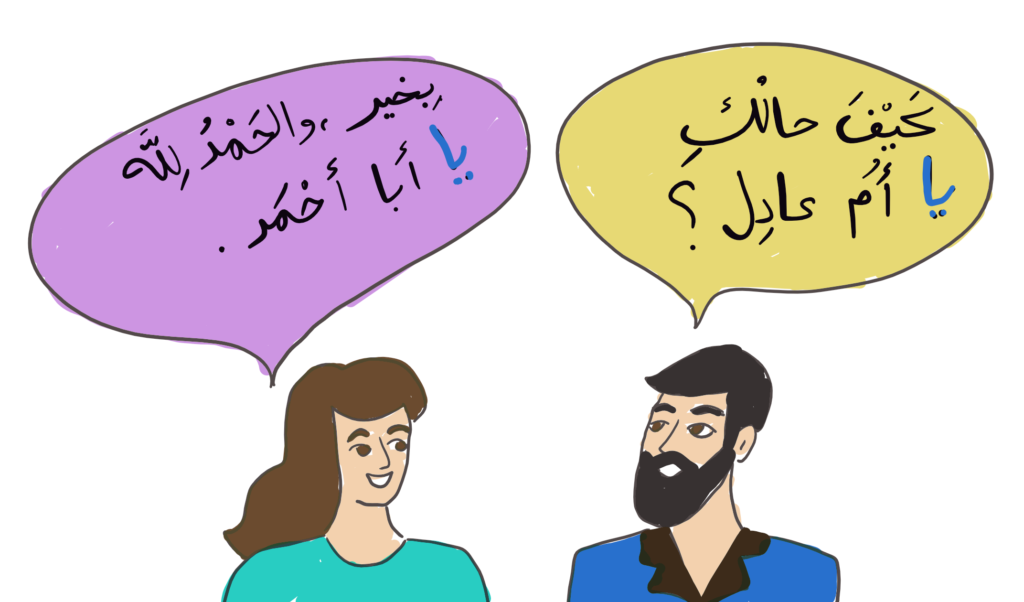The Vocative Particle يا Posted by yasmine on Mar 31, 2021 in Arabic Language, Grammar
As Arabic language learners, you have most likely seen and heard the vocative particle يا being used before nouns. Can you think of any examples? In this post, I thought we’d understand its purpose in Arabic and look at how it is used through reading and listening to examples. Does the vocative case happen to exist in your language?
✨ يا: O/oh/hey
يا is a vocative particle, similar to “O” in English yet used much more frequently in Arabic without sounding a bit strange or archaic as it may sound in English. يا is used to address someone or a people. The vocative can serve as a means to send an invitation to the spoken-to in order for him/her/them to pay attention to what the speaker wants to say. It can also put emphasis on the one being called or addressed.
In some contexts, a close equivalent to modern day English is “Hey” when calling out to someone, for example, يا علي “Hey Ali”. You will find that يا is used in both Modern Standard Arabic (MSA) and colloquial Arabic. In this post we will be looking at examples in MSA. You can find many examples of يا in Qur’anic verses آيات قُرآنية and poetry شِعر.
?The vocative in Arabic is called النِّداءُ to mean the act of calling someone which is derived from the verb (نادَى/يُنَادِي) which means “to call”. The term used for the noun being called is المُنادى.
You can find “the called noun” or المُنادى in the following forms:
Singular form مُفْرَد which could be a proper noun such as a name for example يا سليم or يا ليلى, or intended nouns without the definite article ال for example يا رَجُل or يا وَلَد. The called noun could also be in plural جَمْع and dual مُثَّنى forms for example, يا أطفال addressing children or يا رَجُلان addressing two men.
If the مُنادَى is prefixed with the definite article ال, than we add أَيُّها before the masculine noun and أَيَّتُها before the feminine noun whatever the number is (singular, dual, or plural).
For example:
يا أَيُّها الرَّجُلُ
يا أَيَّتُها البِنْتُ
Let’s read and listen to some examples. ?
.يا يُوسُفُ قُمْ بِواجِبُكَ
Yusuf, do your homework.
.يا كَسْلانُ ادرُسْ
Oh lazy one, study.
.يا أَيُّها الحُكّام اعْدِلوا
Oh rulers, be just.
فيمَ تُفَكِّرينَ يا أُختي؟
Sister, what are you thinking about?
.مرحباً يا فادي
Hello, Fadi.
!يا إلهي
Oh my God!
.يا الله
Oh God.
.يا رَبّ
Oh Lord.
.يا أَيُّها المُؤْمِنونَ
O you believers (example from the Quran)
صَباح الخَيْرِ يا سيدي، هل يُمْكِنُني أنْ أُساعِدُك؟
Good morning, sir. Can I help you?
.يا خالِدُ، تَعال إلى هُنا مِن فَضلك
Hey Khalid, come here please.
!يا شَباب
Hey guys!
.يا أَيَّتُها الفتاةُ لا تُغْضِبِي والَِدَتُكِ
Oh girl, do not irritate your mother.
.يا رَبَّ الْعالَمِينَ
Oh God of all kinds. (example from the Quran)
كَيْفَ حالُكُم يا أَصْدِقائِي؟
How are you my friends?
.يا أَيُّها النَّاسُ ساعِدُوا بَعْضَكُم
Oh people, help each other.
I hope these examples helped you grasp the concept of using the vocative particle يا. Don’t hesitate to use it yourself when addressing other Arabic speakers. ?
Till next week, happy Arabic learning! ?

Build vocabulary, practice pronunciation, and more with Transparent Language Online. Available anytime, anywhere, on any device.





Comments:
Khalil rahman kamara:
Great lesson thank God that such is existing . Very good and important to us arabic learners. Mat Allah bless, protect and guide us to the right path. Ameen yaـRaab.
Mohammed:
Excellent post. Could you share (a) previous posting on diacritical mark rules and its corresponding spoken pronunciations if any. (b) Also the learning transition stage from reading/speaking with diacritical marks to proficient user.
Faiza Ali:
I am so grateful , learned new things in a very easy way
just want to know the meaning of ayyuha so that i can under stand real wisdom behind using this word, Allah bless you.